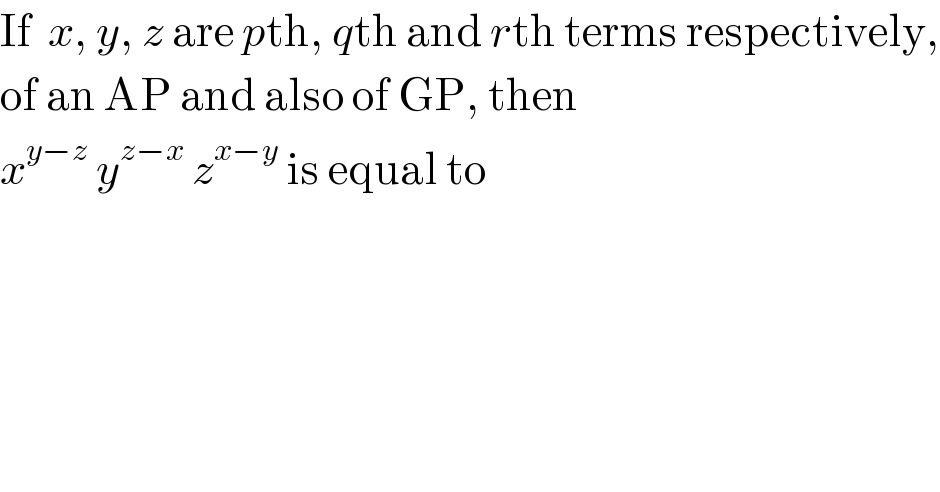
Question Number 16707 by myaoo5678 last updated on 25/Jun/17

$$\mathrm{If}\:\:{x},\:{y},\:{z}\:\mathrm{are}\:{p}\mathrm{th},\:{q}\mathrm{th}\:\mathrm{and}\:{r}\mathrm{th}\:\mathrm{terms}\:\mathrm{respectively}, \\ $$$$\mathrm{of}\:\mathrm{an}\:\mathrm{AP}\:\mathrm{and}\:\mathrm{also}\:\mathrm{of}\:\mathrm{GP},\:\mathrm{then}\: \\ $$$${x}^{{y}−{z}} \:{y}^{{z}−{x}} \:{z}^{{x}−{y}} \:\mathrm{is}\:\mathrm{equal}\:\mathrm{to} \\ $$
Answered by Tinkutara last updated on 25/Jun/17

$${x}\:−\:{y}\:=\:{y}\:−\:{z} \\ $$$$\mathrm{and}\:\mathrm{2}{y}\:=\:{x}\:+\:{z}\:\Rightarrow\:{z}\:−\:{x}\:=\:\mathrm{2}\left({y}\:−\:{x}\right) \\ $$$$\mathrm{Also}\:{y}^{\mathrm{2}} \:=\:{xz} \\ $$$${x}^{{x}−{y}} {z}^{{x}−{y}} {y}^{\mathrm{2}\left({y}−{x}\right)} \:=\:\left({xz}\right)^{{x}−{y}} {y}^{\mathrm{2}\left({y}−{x}\right)} \\ $$$$=\:{y}^{\mathrm{2}\left({x}−{y}\right)} {y}^{\mathrm{2}\left({y}−{x}\right)} \:=\:{y}^{\mathrm{0}} \:=\:\mathrm{1} \\ $$
Commented by myaoo5678 last updated on 26/Jun/17

$${thanks}\:{a}\:{lot}\:{Sir}. \\ $$
